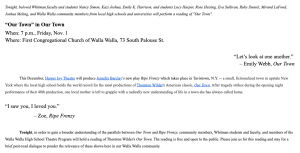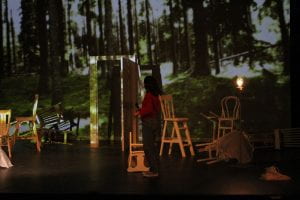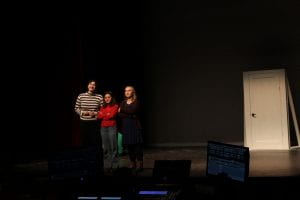Ashlyn Quintus. What has the trajectory of your work been like and how has it evolved in ways that have surprised you?
Miranda La Fond. So I started off this whole process by reading the play, and that happened back in May when I first learned we were doing it, the first time I read it was like getting hit by a train a little bit and then its also funny and touching. So, I had all these contrasting emotions while reading it, but then I learned that the playwright, Jennifer Barcley, wrote it in response to another shooting but she used the text, A Mother’s Reckoning by Sue Klebold to kind of frame her arc…so I read that in the summer and kind of jumped in that way to get a better idea of the playwright’s thought process.
 From there, I did a lot more general research about the status of the country to get more background context because that’s my thing, historical context. I don’t know I still think a lot about when I heard about what went on in College Place. I want to phrase this the right way. It was hearing that it was so close that kind of shocked me more than it maybe should have because at this point, are we to be surprised by this kind of violence when it occurs? And that was also chilling because like ‘oh, are we not supposed to be surprised? Is this an expected thing at this point?’ But I’ve been really focused on what does this play means for Whitman students? And what does this play means for Walla Walla? and why are we doing this here? Why now? And that’s kind of been my project in a way, trying to get more people into the room and at least meet with them and talk to them and hear their perspective.
From there, I did a lot more general research about the status of the country to get more background context because that’s my thing, historical context. I don’t know I still think a lot about when I heard about what went on in College Place. I want to phrase this the right way. It was hearing that it was so close that kind of shocked me more than it maybe should have because at this point, are we to be surprised by this kind of violence when it occurs? And that was also chilling because like ‘oh, are we not supposed to be surprised? Is this an expected thing at this point?’ But I’ve been really focused on what does this play means for Whitman students? And what does this play means for Walla Walla? and why are we doing this here? Why now? And that’s kind of been my project in a way, trying to get more people into the room and at least meet with them and talk to them and hear their perspective.
AQ. Why Ripe Frenzy? Why here on Whitman campus? Why now?
MF. …A lot about choosing plays depends on people who are not me, these aren’t students that do this, so I started by asking other people ‘why did you choose to do this?’ and that is helpful to a certain point I think because everyone makes a choice about why they want to do a play…but I think that it’s possible for this kind of choice to evolve in a way and take on more as more people come into it. And it’s gonna look different everywhere you do Ripe Frenzy, right? So like they’ve never done Ripe Frenzy here, they’ll probably never do it again, but yeah, the talkbacks are a way for the show to have more of an emphasis on the here and now and by bringing people into the room who are community members…it’s honestly a perspective thing, we want to get more people in and have discussions.
AQ. Last month, you both [Miranda and Emily] got off campus and hosted a community-wide reading of Our Town at the First Congregational Church. From what I understand, afterwards you hosted a dialogue with everyone who attended, discussing parallels between the town in Our Town and Walla Walla and how this relationship might be paralleled with the fictional New York town where Ripe Frenzy takes place. Were there any responses from the community members that surprised you or altered the way you approached your work on this show?

ML. …First of all, what always springs to mind for me from that reading was how touching it was to see people coming together and there was this environment, this climate of, I don’t know, camaraderie a little bit and between like the town, people from Walla Walla who don’t necessarily come to Whitman shows and the Whitman students and the high school students. It was just an interesting mix…One man in the audience, he mentioned ‘oh, I got married right there’ in the church where we did it, in First Congregational, and as you know, in act two George and Emily get married, and he saw that moment across time and across space in the fictional and the real and that was an interesting way of tying together how something that’s written by a playwright can trigger these emotional memories in people and bring them together that way.
Another moment from that night was when our director Emily mentioned that there had been a boy who was arrested for attempting to, well plotting to commit a school shooting in College Place, you could hear a pin drop in the room because it was obvious that not everyone had heard that and then like being in that space with them and having just done that reading of Our Town, we’d already come together but it was that moment where we knew something was off and we were like ‘okay, what now?’
Emily K. Harrison. It was interesting, there was one person who spoke about how Walla Walla was recently listed as one of the friendliest towns in America and she was like. ‘if this is the friendliest town in America, why is it so hard to make friends?’ Which I thought was a really interesting question and I think has so much to do with the way… people are interacting with each other a lot more online than [in] face-to-face scenarios, and that’s part of the problem, technology is really great in a lot of ways but also really isolating… And thinking about Whitman in context to that too and what a sort of bubble Whitman is in the community. I don’t really have any friends outside of Whitman, I mean I’m a visiting professor so it’s not like I’m going out of my way to meet a bunch of people or anything like that, but yeah, it’s interesting…
I grew up in a small town and did leave that town and I can’t imagine living there, not because it’s a horrible place to live, but just because what I do, I make theater and I just don’t know what I’d do in that town. It’s a beautiful little town but it’s interesting to me that that’s where my mother grew up and she still lives there, and that’s the town my grandmother grew up in and died in… There’s commentary about that in Our Town, and I think it’s Mrs. Gibbs who wants to travel to France, and she never gets the opportunity to do that before she dies.
AQ. You serve as the producing artistic director at square product theatre based in Boulder, CO. There, you’ve worked on a myriad of shows dealing with difficult and controversial issues such as the aftermath of Hurricane Katrina in the production Slab, and the play House of Gold that explored the awful local murder of JonBenét Ramsey through her eyes. How does directing the material that Ripe Frenzy explores in the town of Walla Walla compare to your work on these past productions?
EKH. It’s similar because a lot of what I’m interested in, both as an artist and a scholar, are these sort of American disaster narratives, and a school shooting is just as much a disaster as Hurricane Katrina… In the case of House of Gold, a play in which I played a character named JonBenét Ramsey, and there are some people who were really not happy about us doing that play, because she was murdered in Boulder and we did it in a theater that was a few blocks from the home where she was murdered…
There has not been, to my knowledge, a school shooting in Walla Walla but there was a young man who was planning a school shooting in College Place just a few months ago. His mother turned him in and he was found to be a credible threat and they were able to stop that from happening… And certainly there have been school shootings and other mass shootings that have happened in Washington and very close… There’s a fine line between traumatizing or retraumatizing people and just bringing awareness to a reality that maybe uncomfortable.
AQ. I was struck by a quote of yours in an article by Denver’s Mile High Magazine discussing the production House of Gold. You stated “These are topics that people are uncomfortable talking about…People want to have these conversations, but they don’t know how to have them. Art is a really great way because it engages someone’s empathy.” In what ways do you hope Ripe Frenzy will engage people’s empathy?
EKH. I think when we think about events like school shootings or mass shootings, it’s really easy to get into these black and white scenarios where like this thing is to blame, or this person is to blame, it’s guns, it’s mental illness, it’s bad parenting, and it’s not that black and white ever… It’s a perfect karmic storm in this country where you reap what you sow, we have an entire nation founded on genocide and built on the backs of slaves, a lot of violence. That violence is cyclical and people continue to be shocked by these explosions of violence and… I don’t know how you can be shocked anymore, it’s not a new thing. Our first school shooting was like in the 18th century or something like that, that was a long time ago, it’s not a new phenomenon. I think it’s looking at how and why these things happen rather than the who, necessarily, and the repercussions that it has on all members of the community including perpetrators or the families of perpetrators. One of the research items I found to be useful in my work on this was Sue Klebold’s book. Sue Klebold is Dylan Klebold’s mother and he’s one of the Columbine shooters and her perspective has been really, really interesting and useful in our process… and I think it’s really, really easy to point fingers at parents and say ‘well, if your child was up to something this serious, you should have known about it’ and it’s not that simple, it’s just not that simple, people are really good at hiding things and pretending that things are fine when they’re not fine.
EKH. I mean, I think that’s how really good plays and works of literature and works of art function, they force you to have a reckoning with what the other experience is and it can be very uncomfortable but also give you a lot of perspective and empathy for what other people experience because we’re an individualistic culture and we very often only consider our own experience and sometimes just forget that other people exist and have completely different perspectives or experiences.
AQ. How do you take care of yourself or separate yourself from this job? Are there other practices that you do to keep things light?
EKH. I try to read a lot of stuff that has nothing to do with my work and that’s really helpful. I read a lot of books, I spend a lot of time with my cat who’s like the best dude ever, I watch really good television and movies. Some people would say ‘that’s just escaping, that’s escapism’ I mean, yeah and you know, I don’t, like when I’m working on a play I do spend a lot of time thinking about it but I do make sure that I have other things that I’m doing so I’m not just, especially a play like this, where it’s a very serious topic, I mean, it’s also a very funny play but I don’t spend every waking hour thinking about this play.
Ripe Frenzy opens this Thursday December 12 -14 @ 8 PM and December 14 -15 @ 2 PM at the Alexander Stage, Harper Joy Theatre. Buy your tickets online here or @ the HJT Box Office, open 12 - 4 PM M - F (509)527-5180. Note: This production deals with sensitive subject matter and contains explicit references to acts of gun violence in addition to explicit language, sexual innuendo, projections of dead animals, and loud sound. This show may not be suitable for young children, parental discretion is advised.




Thank you for your sharing. I am worried that I lack creative ideas. It is your article that makes me full of hope. Thank you. But, I have a question, can you help me?